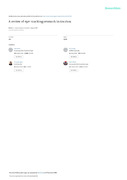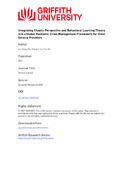Jenny Dung Le, PhD
Duyệt theo
Dr (Jenny) Dung Le is an Assistant Professor in the College of Business and Management. Before joining VinUniversity, she has 10 years of research and teaching experiences in Vietnam, Australia (Griffith University – number 1 university in tourism and hospitality management) and the USA (as a visiting scholar at Cornell University, Nolan School of Hotel Administration – number 1 school in hotel management in the USA). Dr Le completed her doctoral program at Griffith University, Australia, in 2020 and has published many papers in the top-ranking tourism and hospitality journals, including International Journal of Hospitality Management, Journal of Sustainable Tourism, Current Issues in Tourism, Tourism Review. Her teaching and research interests include eye-tracking technology, digital marketing, emotions, experience design, crisis management and sustainability. Also, she participated in several consulting projects for industry partners (e.g., Mantra hotel group, Intrepid Travel group, Vietnam Electricity group) and provided practical implications based on customer research.
Các tài liệu mới cập nhật
-
A review of eye-tracking research in tourism
(2017-08-10)This study provides a review of eye-tracking as a technique for measurement of attention. The review discusses its theoretical basis, advantages and disadvantages, data collection procedures, analysis methods, and application ... -
Integrating chaotic perspective and behavioral learning theory into a global pandemic crisis management framework for hotel service providers
(2021-07-01)Hotel service providers are among the most affected by the evolving Covid-19 pandemic. Although the consequences of the pandemic on hotel operations have been widely examined, the question of how hotel businesses can revive, ... -
The role of capital structure management in maintaining the financial stability of hotel firms during the pandemic—A global investigation☆
(2022-10-13)Due to the detrimental effects of the Covid-19 pandemic on the hotel sector, pandemic crisis management research has received lots of academic attention, from studies in sales-marketing to human resource management. However, ... -
The role of public space in constructing experience capital: A longitudinal analysis in the hotel context
(2023-01-24)Public space plays a primary role in shaping customers’ hospitality experiences. Yet how public space conditions customers’ experiential outcomes in accumulating capital for hospitality organizations remains underexplored. ... -
Impact of prior knowledge and psychological distance on tourist imagination of a promoted tourism event
(2021-09-12)Experiential marketing has emerged as an effective strategy to promote hedonic tourism and hospitality experiences through stimulating tourist imagination and positive emotions. This study aims to broaden the existing ... -
Gaining public engagement to restore coral reef ecosystems in the face of acute crisis
(2022-03-21)The twin crisis of biodiversity loss and climate change make it urgent to find ways of restoring natural ecosystems, including coral reefs. Methods for coral reef restoration are rapidly advancing, bringing with them a ... -
How to win the consumer’s heart? Exploring appraisal determinants of consumer pre-consumption emotions
(2020-04-23)Emotions are key drivers of consumption in the tourism and hospitality sector. Therefore, advancing our understanding of the determinants of consumer emotions is critical for tourism and hospitality marketers to effectively ... -
A Review of Eye-Tracking Methods in Tourism Research
(2017-08-10)Technological advancement provides opportunities for improvements in the methods academics use in their research. Traditional studies of advertising and interpretive material effectiveness typically use self-report surveys ... -
Strategic responses of the hotel sector to COVID-19: Toward a refined pandemic crisis management framework
(2020-12-03)The Covid-19 pandemic has long-lasting impacts that require the hotel sector to revise, innovate, and transform their businesses. However, the literature related to this area remains vastly under-developed. Based on 219 ... -
Integrating Chaotic Perspective and Behavioral Learning Theory into a Global Pandemic Crisis Management Framework for Hotel Service Providers
(2021-11-02)Hotel service providers are among the most affected by the evolving Covid-19 pandemic. Although the consequences of the pandemic on hotel operations have been widely examined, the question of how hotel businesses can revive, ... -
“Are your employees mentally prepared for the pandemic?” Wellbeing-oriented human resource management practices in a developing country
(2022-12)Employees are the most valuable asset of any service business because of its human-centric nature. However, in the crisis situations, the human side in crisis management strategy, particularly in the areas of human resource ...










